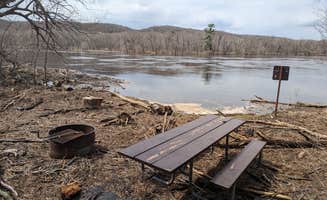Sandy Cove on the St. Croix River provides primitive camping near Roberts, Wisconsin, with a distinct location along the Ice Age Trail system. The site sits at approximately 700 feet elevation within the St. Croix River Valley, which forms the natural border between Wisconsin and Minnesota. Winter camping isn't recommended due to flooding risks during spring thaw periods, with water levels fluctuating significantly between seasons.
What to do
Water activities: Sandy Cove offers direct river access for paddling, swimming, and fishing during summer months. The location provides a natural launching point for kayaks and canoes, though campers must transport their watercraft to the site.
Trail exploration: The crushed gravel pathway connects to both the Ice Age Trail and Lions Park, allowing for day hiking opportunities. The Ice Age Trail section features interpretive markers explaining the glacial formation of the region.
Wildlife observation: The riverfront location attracts various bird species including eagles, herons, and migratory waterfowl. Early morning hours typically offer the best viewing opportunities for both birds and river mammals.
What campers like
River views: The St. Croix River location provides a peaceful setting with natural ambiance. According to Travis B., the site is "Right on the beautiful St. Croix river," offering direct water access uncommon for primitive sites in the area.
Accessibility features: The site includes wheelchair-friendly accommodations not typically found at dispersed camping locations. The picnic table includes "an extra long side for those in a wheelchair," making this primitive site more accessible than many others in the region.
Trail connectivity: The campsite's position allows hikers to continue their journey along the Ice Age Trail after overnight stays. The "Well managed gravel trail to the south and single wide footpath to the north" provide multiple options for continuing trail experiences.
What you should know
Site facilities: The campsite includes a designated pad, fire ring, picnic table, and an open-air vault toilet located up a path from the main area. No drinking water is available, so all water must be packed in or filtered from the river.
Seasonal challenges: Spring flooding can significantly affect site conditions. After periods of high water, facilities may be displaced or damaged, as noted in visitor observations: "We visited in April after historic snowfall and thaw causing the river to flood. I'd imagine when the river is lower with the fire ring and table where they're supposed to be this would be a nice place for the night."
Permit requirements: Overnight camping requires obtaining the proper permit before arrival. These permits cannot be secured on-site, so advance planning is necessary.
Tips for camping with families
Pack accordingly: The hike-in nature of the site means all supplies must be carried from the nearest parking area. Families should pack minimally but include essentials such as water filters, food storage containers, and weather-appropriate gear.
Safety considerations: The riverfront location requires close supervision of children due to changing water conditions. The site has no barriers between the camping area and the water's edge.
Educational opportunities: The Ice Age Trail connection offers learning experiences about glacial geology and Wisconsin's natural history. Consider bringing field guides to identify local plant and animal species.
Tips from RVers
No vehicle access: Sandy Cove is exclusively a hike-in or walk-in campsite with no facilities for RVs or trailers. The nearest vehicle parking requires a short hike to reach the camping area.
Alternative options: RV campers seeking nearby options should consider established campgrounds in surrounding communities that offer hookups and vehicle access not available at primitive sites like Sandy Cove.


